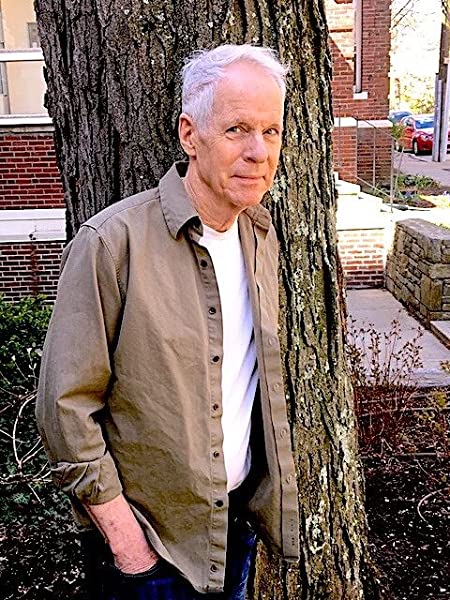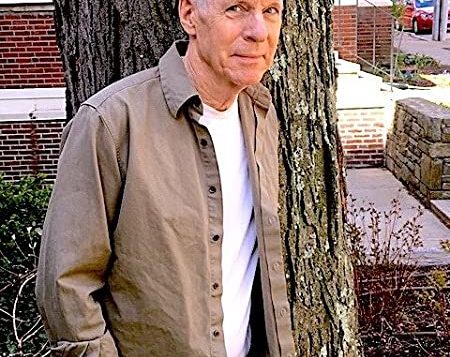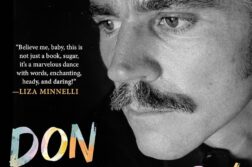
A WELL-KNOWN PLAYWRIGHT and novelist, Sebastian Stuart is the author of a memoir titled What Wasn’t I Thinking: A Memoir of Rebellion, Madness, and My Mother. It delves into his privileged childhood in Manhattan, where he discovered his (gay) sexuality as a teenager, and into his deep friendship with his soulmate and cousin Tina, who was stricken with schizophrenia at fifteen. The challenge of trying to save her and not be pulled into her madness proved too much; he left for San Francisco in his late teens. He writes compellingly about his wild sexual past, including hustling and his descent into drugs.
Stuart’s other books include the novels The Mentor (1999), To The Manor Dead (2011), and the award-winning novel The Hour Between (2009). His plays include Underbelly Blues, The Frances Farmer Story, and Ethel and Miriam.
The interview was conducted by phone in January 2022.
Gay & Lesbian Review: Can you give us an overview of what your journey was like from actor to playwright to novelist?
Sebastian Stuart: I was in San Francisco, where I was a wild kid while living there. I went back East obstinately to become an actor but I soon realized that I didn’t have the chops for it. I was pretty insecure, as most actors are, but I took it pretty far. So, I asked myself what else could I do. I had all these bottled-up experiences from living in San Francisco, and so I sat down and they just poured out of me, and I wrote the play Underbelly Blues. Edward Albee read it and gave me a grant for a residency in his Long Island workshop in Montauk. It was produced for a three-day run and later at the Eugene O’Neil playwright conference. So I said: “This is easy.” This was something I could do—but there are about ten playwrights making a living at it! I kept writing plays, which I really enjoyed. I loved the reaction of the audience when I made them laugh.
Then I was looking for other writing gigs, and I started writing porn for a while. That was a really good gig. You would go in on a Monday, and they would give you a setting—like a suburban cul-de-sac with incest—and you had four days to write the whole book. It all went into a primitive computer, kind of like braille, and then it would get printed out with no re-writing at all.
Next I started writing screenplays with a friend; we had four optioned. I had plays going up at La Mama and The Kitchen theaters in New York. I went to a writers’ center called Dorset Colony House in Vermont, and that’s where I met Stephen McCauley [author of the novels Object of My Affection, My Ex-Life, and Insignificant Others]and we clicked. So, I decided to move up to Cambridge, Massachusetts, to be with him. We’ve been together now for 31 years.
G&LR: So how did you get into writing other kinds of books?
SS: I had a friend in Boston who was ghostwriting business books, and he introduced me to the publisher, and I started doing the same, which I did for about twelve years. Stephen and I also wrote three children’s musicals, and I ghostwrote a bestseller titled Charm, by Kendall Hart, a character on All My Children. Then came 24 Karat Kids, about a Park Avenue pediatrician. I also wrote three action thrillers. I have written anything and everything you can think of.
G&LR: And now you’ve written a memoir. What’s the back story on that?
SS: I was a victim of survivor’s guilt. My best friend and cousin, Tina, who was incredibly beautiful and talented, developed schizophrenia in her mid-adolescence. I wanted to write something to honor her and make sense of all that happened, and about schizophrenia itself. It would be hard for me not to overstate what good friends we were, and then to have her snatched away, it really messed with me in ways I didn’t understand at the time. I ran out into the world in an obliterating way.
I also wanted to honor my mother’s mother, Elsie Malinowski, who was married to the famous anthropologist Bronislaw Malinowski. Elsie developed multiple sclerosis, and it took her eleven long years to die, which was most of my mother’s childhood. Elsie was erased from the family. She had written two books, An Untamed Territory and The Northern Territory of Australia, but she was completely forgotten. So, I wanted to pay tribute to Tina and my grandmother. That was my motivation: to tell their stories as well as mine.
G&LR: You describe Tina going to the Ford Modeling Agency Party and her mother eviscerating her verbally. Do you think that that propelled her further into mental illness?
SS: No, the die was cast. She developed schizophrenia around fifteen or sixteen. She was signed by the Ford agency as a model, and I was her escort to the party at the Waldorf Astoria to introduce their new models. She came out that evening wearing an off-the-shoulder brown velvet dress, looking absolutely stunning. Before we left home, her mother Wanda—who was once a great beauty herself, now ravaged by alcohol and jealous of Tina’s beauty—suddenly and viciously started to attack her. It was devastating to me, let alone Tina, who sat there muttering to herself: “You’re the devil, you’re the devil.” When we went to the Waldorf, Tina was completely withdrawn, a reaction typical of the disease.
G&LR: You write of the realization that life with Tina was going to change you in a profound way. Can you elaborate more on that?
SS: A big part of me wanted to help her, but at the same time I didn’t want to be pulled into this disease. I wanted to have fun. I moved to San Francisco when I was seventeen, to this wonderland, in the late 1960s. I did have Tina come out and live with me for a while. She had some good moments, even went into remission for a short while, but it ended badly. I got into the low life—some IV drug use, surviving as a hooker and a thief. These were symptoms of my desire to obliterate my feelings. “What wasn’t I thinking?” [hence the book’s title]. As a clueless, inexperienced kid, I was a predator’s dream because of my vulnerability.
G&LR: You say that your grandfather, Bronislaw Malinowski, cast a long shadow over the family and was kind of a shit—how so?
SS: Because he was famous. He wrote a book called The Sexual Life of the Savages [in North-Western Melanesia]. He was an intellectual and traveled in the right circles. He still elicits excitement and he is still read. That was a big part of the shadow—that we were superior. His father was chancellor of universities in Krakow and in London. It was this intellectual baggage that we lived with, and I am about as intellectual as a pet rock! We had to live up to him and show that we were better than other people, which was profoundly self-destructive. As for him being a shit, when his wife got sick, he pulled away and went on to have this big career. When she died, he brought his mistress to the funeral! His wife Elsie was a kind, soulful woman, a nurse in World War I, who wrote books. She deserved better than that.
G&LR: You write about your active sex life as a youth. Was that difficult to reveal? How was this related to your upbringing?
SS: It wasn’t difficult to reveal. If I was going to do this, I was going to have to write it all down. I was rebelling against my parents. I was a rebellious kid, against the way I was raised. The irony is that my parents were liberal and open-minded. They were sophisticated and ran in tony circles in New York. I was rebelling against them and had to get away on some level.
G&LR: Did you feel like a sexual outlaw, or were you just part of mainstream gay life at the time?
SS: It was 1967, the height of the ’60s. There was lots of cross-pollination between the hippies and the queens. I was a sexual outlaw. I loved shooting up speed, going on a three-day run in this out-of-body way. Having these sexual adventures—I had some sweet, loving sex too—I ran the gamut. I loved having these men pay attention to me. I had a small handful of men who did so. It gave me a feeling of self-worth. My mother had undermined me. Sounds corny, but she did. She was competitive with her children. I was a sexual outlaw, but I sensed it was dangerous, and I got out of it pretty quickly. It was a crazy world. I knew all the glitter queens, like the performing group The Cockettes, plus all these mad, hard, killer queens who would shoot up. It was a completely different world.
G&LR: You talk a lot about the AIDS crisis. Young gay people today didn’t experience the destruction and fear of those times. What do you want them to learn from your book?
SS: I wanted it not to be forgotten, not only for spiritual and historical reasons, but for health reasons also. The virus is still out there. It is nothing you want to get or give to any other person. My best friend got infected and died. I write about that in the book. The magnitude of loss, especially people in the arts, was devastating. But a lot of good came out of it. Gay people pulled together; groups were formed to help. It changed our political and lifestyle direction. It led to our political power and the advances toward equal rights.
G&LR: You describe growing up on Central Park West and looking down on Central Park and its very active gay cruising area, which made quite an impression on you. How so?
SS: From my bedroom window on the third floor, I could see all these men, hundreds of them from 59th Street to 86th Street. It was kind of sultry, the men in various stages of dress or undress. It was very hot seeing all these men pick each other up and go home. I think most gay boys find ways to have same-sex experiences as teens, and finding out you are not alone. I never had any feelings of shame. I knew I was different, and seeing those men, I knew I wasn’t the only homo in the world.
G&LR: Your parents socialized in elite circles with liberal and gay people around them, like James Baldwin and Bette Midler. Why did you find it so hard to come out to them?
SS: I don’t know. I had started having sex at twelve and it took me five years to come out to them at age seventeen. It was still a big thing at the time. We were ostracized; cops would come after us; and society portrayed us as a menacing lisping stereotype.
G&LR: Did writing this help you put your feelings for Tina, your mother, and your grandmother behind you?
SS: No, it has brought them to the fore. It brought my grandmother to life for me. My mother never talked about her other than to say that “she was a nice woman.” I think writing this has made me a better person and brought up my empathy level. Memoirs are subjective. I tried to keep it as honest as possible. I think that’s really important.
William Burton is a writer based in Provincetown, Mass.





